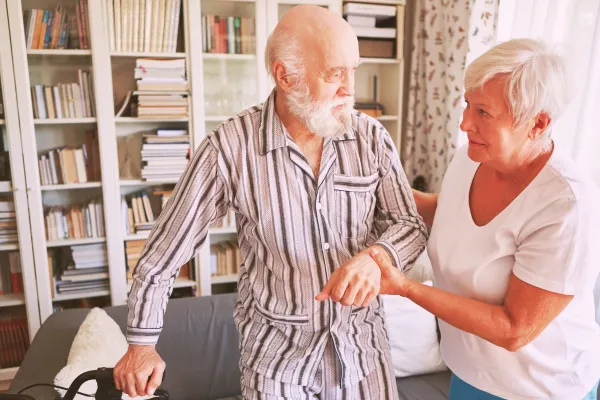
Why Dementia Turns Every Yes Into No (and What You Can Do About It)
If you’re caring for someone with dementia, you’ve likely had this moment: you ask them to take a shower, eat the meal you lovingly prepared, or take the medication that keeps them stable and the answer is a firm no.
It can feel like rejection. It can feel personal. It can even feel like failure.
But here’s the truth: those no’s aren’t about you, and they aren’t about your ability to care. They’re about the disease. Dementia changes the way the brain processes fear, memory, language, and control. Once you understand the reasons behind the resistance, you can approach these moments with confidence instead of frustration.
The Fear Behind Every No
For many people with dementia, “no” is another way of saying I’m scared.
Think about a shower, for example. For you, it’s a simple daily routine. For them, it might feel like stepping into an unfamiliar, cold, and confusing environment. The bathroom may no longer look familiar. Even you, the spouse or daughter they’ve known for years, might not feel recognizable in that moment.
So they say no. Because no is the only power they feel they have left.
The same is true with medications. Swallowing a pill may seem straightforward, but for someone whose brain is struggling to connect steps, it can feel dangerous or overwhelming. That no is their last line of defense against something they don’t fully understand.
The Grief Hidden Inside Refusals
Here’s something that breaks my heart every time: every no is also grief.
Your person remembers what life used to be like, even if only in fleeting moments. They may not have the words to express it, but they feel the loss of independence and identity deeply. When you step in to help with something they once did easily - getting dressed, paying bills, making coffee - it highlights what they can no longer do.
That no isn’t about the task itself. It’s about the sorrow of losing themselves, piece by piece.
One daughter I worked with told me she felt like her mom was just being stubborn about getting dressed. But when we slowed down and looked closer, we realized the buttons and zippers were simply too confusing. Mom wasn’t resisting her daughter. She was protecting herself from feeling embarrassed and overwhelmed.
Overwhelm: When the World Feels Too Loud
Dementia also changes the brain’s ability to filter and process information. What feels like a normal evening to you - TV in the background, grandkids playing, dinner cooking on the stove - can feel like chaos to your loved one.
In that kind of environment, even a simple request can push them over the edge. “Take your medication now” may feel impossible to process on top of everything else happening in the room.
So they shut down. They say no. Because their brain simply can’t handle one more thing.
The solution? Simplify. Turn off the TV, reduce background noise, and slow down the pace. When the environment is calmer, their brain has space to say yes.
Communication Breakdowns
Another reason for all those no’s: they may not understand what you’re asking.
Dementia doesn’t just affect memory, it affects language, processing, and comprehension. If you say, “Mom, it’s time to take your shower so you’ll be ready for your appointment tomorrow,” she may only catch the words shower and tomorrow. The rest gets lost.
And when you don’t understand something, the safest answer is no.
This is where caregivers become translators. Instead of long explanations, use short phrases and clear gestures. Instead of “It’s time for your shower,” you might simply say, “Come with me,” while offering your hand and guiding them toward the bathroom.
The less you say, the more they can process.
The Fight for Control
Perhaps the most powerful reason behind the word no is control.
Dementia takes away independence. It dictates where they live, what they eat, what medications they take, and even who is allowed to help them. In a world where almost everything feels out of reach, saying no becomes one of the only ways they can hold on to a sense of self.
That’s why I often encourage caregivers to give back control in small, safe ways. Your loved one may not get to decide whether to take their medication, but they can choose which cup they drink with. They may not be able to choose whether they need a shower, but they can pick the soap or towel.
These small choices protect dignity. And when people feel respected, those automatic no’s start to soften.
Strategies for Caregivers: Turning No Into Yes
So what can you do when your loved one seems to resist everything? Here are four strategies I’ve seen change everything for families:
Slow down. Give them extra time to process requests instead of rushing.
Lead with connection, not compliance. Instead of “You need to eat,” try “Will you keep me company while I have some soup?”
Pick your battles. Not every no is worth fighting. Save your energy for safety and health priorities.
Protect their spirit. Every interaction is an opportunity to say: You matter. You are still you. I see you.
You're Not Alone in This
Caring for someone with dementia isn’t just about keeping them alive, it’s about helping them stay human. And that’s the hardest, most important work in the world.
I know how overwhelming it feels when every day feels like a battle of refusals. That’s why I created the Dementia Caregivers Academy, a place where caregivers can learn practical strategies, share stories, and get support from someone who’s walked this road with thousands of families.
If you’re struggling with the constant no’s, you don’t have to do it alone.
Because behind every no is a reason. And once you understand it, everything changes.
💜 Caring for you while you care for them.
